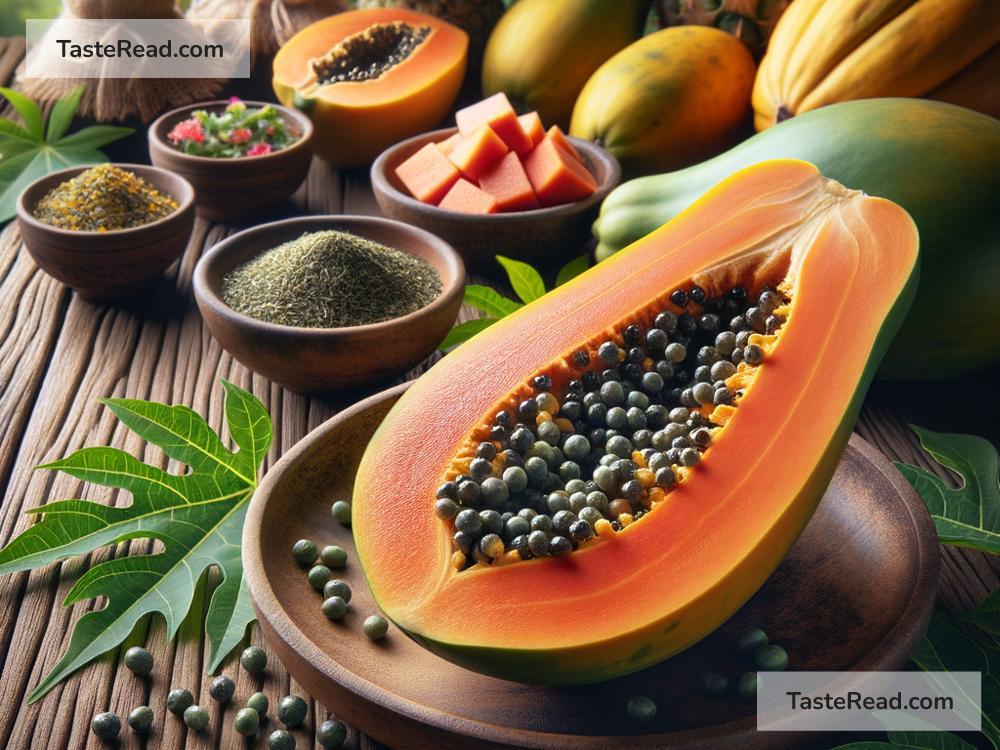The Surprising Role of Papayas in Tropical Medicine
Did you know that the humble papaya has been recognized as a natural healer in tropical medicine for centuries? This sweet, colorful fruit is loved worldwide for its delicious taste, but it’s much more than just a healthy snack. Papayas are packed with nutrients and powerful compounds that offer remarkable benefits for human health. Let’s explore the surprising role of papayas in tropical medicine and why they’re considered a treasure in the world of natural remedies.
A Nutrient Powerhouse
Papayas are bursting with vitamins, minerals, and antioxidants. They are especially rich in vitamin C, which helps strengthen the immune system, and vitamin A, which promotes healthy skin and vision. Papayas also contain potassium and folate, essential for heart health and proper cell development.
But what sets papayas apart when it comes to tropical medicine is their special enzyme called papain. This enzyme is nature’s gift to digestive health and wound healing. Papain is found not only in the soft flesh of the fruit but also in the seeds and the green, unripe papaya. This unique compound makes the papaya far more than just a delicious fruit—it’s an ancient remedy with modern applications.
Papayas and Digestive Health
One of the most well-known uses of papaya in tropical medicine is treating digestive issues. Have you ever felt uncomfortable after a big meal? Papain can help break down proteins and support digestion, reducing bloating and discomfort. Many traditional healers across tropical regions use papaya as a natural solution to soothe stomach troubles.
Additionally, eating ripe papayas can help relieve constipation. They are loaded with dietary fiber and water, which promote healthy bowel movements. On the other hand, teas made from papaya leaves are often used to address indigestion.
Scientists have also conducted studies suggesting papaya may help with symptoms related to irritable bowel syndrome (IBS). By improving digestion and reducing gut inflammation, papayas are earning a reputable place in tropical medicine and modern wellness routines.
Aiding Wound Healing
In many tropical cultures, papaya’s role goes beyond eating the fruit—it’s used as an external treatment for wounds and burns. Papain has antimicrobial and anti-inflammatory properties that help heal minor cuts, sores, and ulcers. The unripe papaya or crushed papaya seeds are applied directly to wounds to cleanse and promote recovery.
Papaya-based ointments are also growing in popularity because they are natural alternatives to chemical-filled creams. These ointments are used for treating wounds, rashes, and even acne. Some tests have shown that papain can speed up wound healing while reducing the risk of infection, which explains its long-standing use in traditional medicine.
The Role of Papayas in Fighting Tropical Diseases
In tropical regions, papayas have also been linked to fighting serious diseases, including dengue fever. Dengue fever is a mosquito-borne illness that affects millions of people every year, especially in tropical climates. One of the key signs of dengue is a drop in platelet count, which can lead to dangerous complications. Papaya leaf juice has emerged as a natural way to boost platelet levels. Although more research is needed, many patients and doctors have reported promising results from papaya leaf treatments.
Papayas also contain antioxidants like beta-carotene and flavonoids, which protect cells from damage caused by free radicals. This makes papayas helpful in preventing infections and reducing inflammation in the body, which is critical for managing tropical diseases.
Papaya Seeds: Tiny Powerhouses
When you eat papaya, do you ever toss out the seeds? If so, you might want to think twice! Papaya seeds have impressive medicinal properties. They’re known for their ability to fight parasites, a common problem in tropical areas. Consuming small amounts of crushed papaya seeds has been shown to help eliminate intestinal worms naturally.
The seeds also contain compounds that improve liver health. By protecting the liver from toxins and aiding its regeneration, papaya seeds could be valuable for treating conditions like liver damage and fatty liver disease.
A Natural Skin Remedy
If you’re searching for glowing skin, papayas might be your answer! Papain has exfoliating properties that help remove dead skin cells, leaving the skin smooth and refreshed. Many tropical remedies use papaya flesh or juice in face masks to treat acne, reduce scars, and brighten the complexion.
Papaya’s vitamin C content also boosts collagen production, which keeps skin firm and youthful. Thanks to these benefits, papayas have become a key ingredient in many skincare products, even outside tropical regions.
A Fruit Worth Celebrating
From aiding digestion to healing wounds and boosting immunity, papayas are truly a gift in tropical medicine. What’s remarkable is how versatile they are—every part of the papaya, from its flesh to its seeds and leaves, offers unique health benefits.
If you live in a region where papayas grow abundantly, consider yourself lucky! Incorporating this fruit into your diet might not only improve your overall health but also connect you to centuries-old wisdom in tropical medicine.
So, the next time you enjoy a slice of papaya or drink a glass of papaya leaf tea, remember that you’re consuming one of nature’s most incredible healers. With its surprising medicinal benefits, the papaya deserves its place among the most celebrated fruits in the world!

